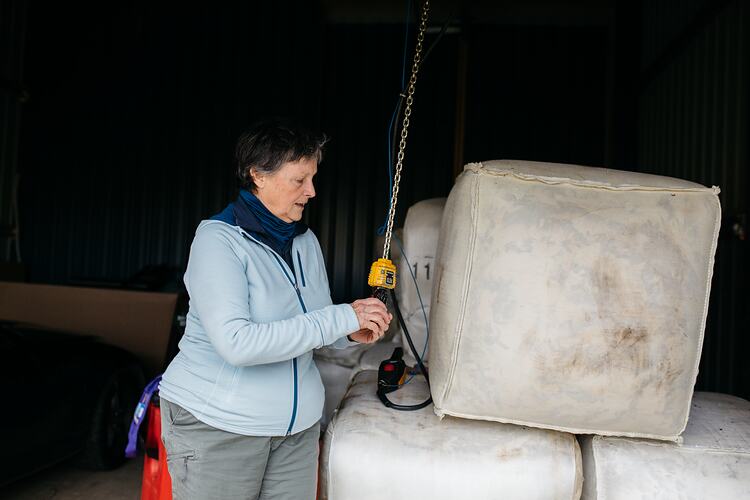Summary
This image is one of 16 photographs of Nan Bray of White Gum Wool, Oatlands, Tasmania, taken by Catherine Forge on 18 January 2018 as part of the Invisible Farmer Project, which included an oral history interview. In this interview, Nan reflects on the key values that have shaped her approach to ethical farming, the various ways that her farm breaks from agricultural convention and the joy and peace she finds in shepherding sheep. She also speaks about her sense of identity as an American expat and scientist farming in rural Tasmania, along with how her scientific background has influenced her approach to agriculture and her understanding of drought, climate change and regenerative farming practices.
This particular image depicts Nan Bray with her Demag half-ton electric hoise, used to load bundles of wool from the press to a level dedicated to storage.
Nan Bray was born in Idaho Falls, Idaho in 1952. Both of her parents had grown up on farms during the Depression and expressed to their daughter that farming was no way to make a living. Despite this, stories of her grandfather's 'cow dogs' and visits to her father's family ranch left Nan with a lasting impression of the skilled working animals that helped to run the farm, a memory which would keep her connection to farming alive as she started to train working dogs as an adult. Nan studied to become a Physical Oceanographer and went on to have a career at the University of California for over fifteen years. While on a trip to visit colleagues working on a project based in Tasmania, Nan fell in love with the island and decided to relocate permanently. She went on to secure a job with Australia's national science research agency, CSIRO, and subsequently made the decision to buy a farm and began running a flock of Merino sheep. For 3 years she juggled a high-profile job at CSIRO with managing the newly-acquired farm, before quitting her job to become a full-time shepherd. From that point onwards, Nan overcame and learnt from numerous difficult situations, including prolonged dry spells that forced her to reconsider the way in which she was farming. Nan reflects in her interview: "What's kept me going is the relationship with the animals and the landscape, [.] the sheer pleasure of being in the landscape with the animals and knowing enough now about their interdependence." Significantly, Nan's farming methodology is distinct from general farming practices in Tasmania; informed by strong ethical values and heavily influenced by research on the importance of diversity in sheep's nutrition, Nan does not mule or dock the tails of her sheep. She also farms with a regenerative focus, including revegetating the landscape and planting native species on the property.
At the time that this photograph was taken, Nan ran a flock of 550 sheep and had established a successful and sustainable farm and yarn business, White Gum Wool, which upheld her ethical values concerning animal welfare and environmental responsibility towards the land. As a shepherd, Nan's role on the farm was diverse and varied; she looked after the flock and guided them to new grazing areas whilst also managing the business and online yarn sales.
This interview is part of Museums Victoria's Invisible Farmer Project Collection. The Invisible Farmer Project was the largest ever study of Australian women on the land, uncovering the histories and stories of Australian women in agriculture. It began as a pilot project (2015-2016) and evolved into a three year (2017-2020) nation-wide partnership between rural communities, academic, government and cultural organisations, funded by the Australian Research Council.
Description of Content
Woman next to large bundles of wool, holding lifting equipment.
Physical Description
Digital Photograph
More Information
-
Collection Names
-
Collecting Areas
-
Photographer
Catherine Forge - Museums Victoria, Oatlands, Tasmania, Australia, 18 Jan 2018
-
Format
Digital file
-
Classification
-
Category
-
Discipline
-
Type of item
-
Keywords
Women Farmers, Women in Agriculture, Women's Issues, Women on Farms, Rural Women, Agriculture & Farming, Farming Methods, Farming Practices, Sheep Husbandry, Sheep, Wool & Sheep Industry, Wool Bales, Lifting Equipment
